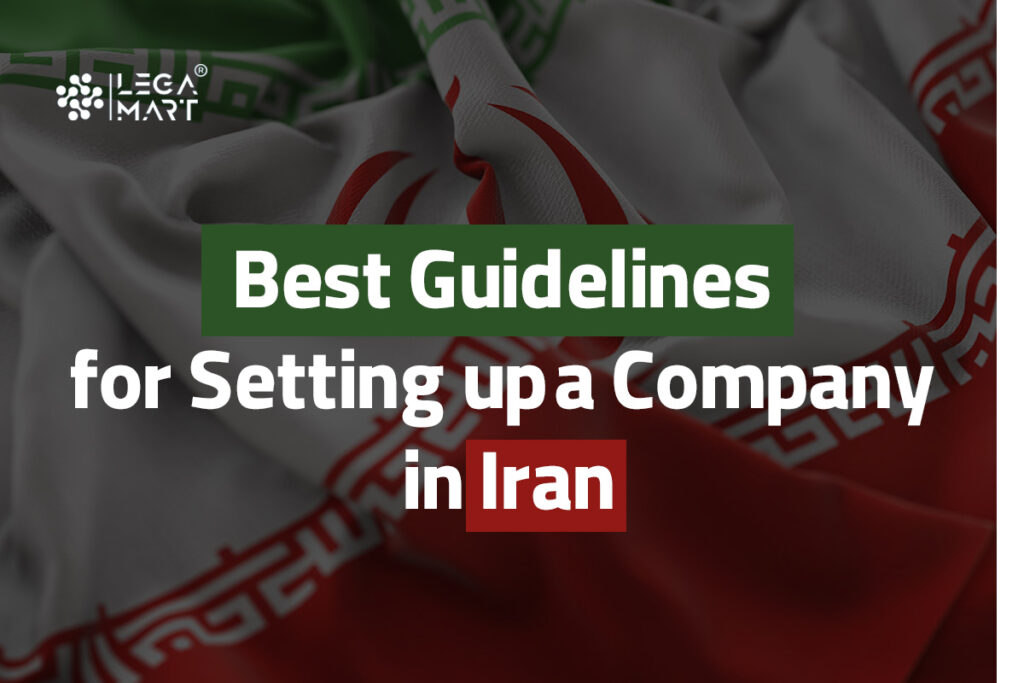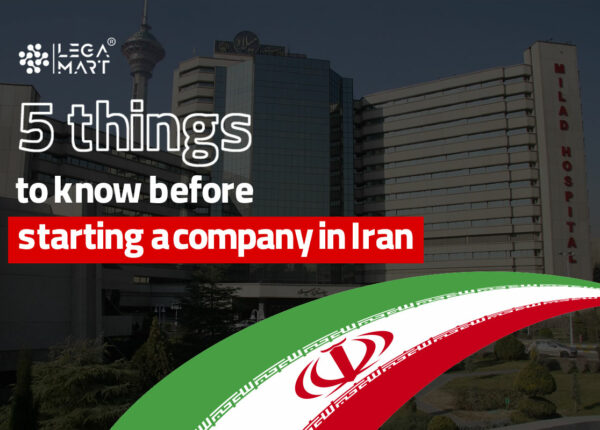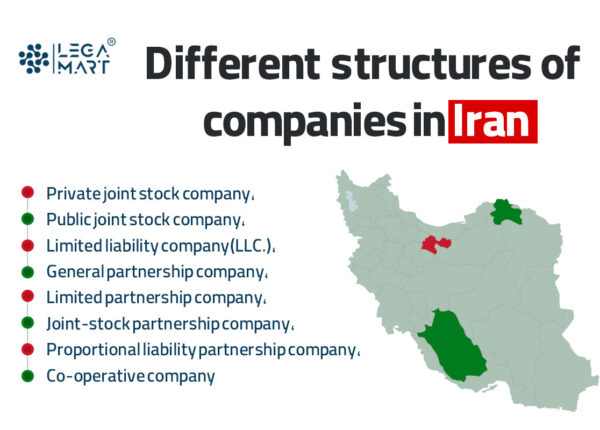Are you seeking to establish a company or corporation in Iran? Different types of companies follow the amending bill to the Commercial Code. Before the formation and registration of a company, one should keep in mind that the business model is determined based on the liability and the capital.
5 things to know before setting up a company in Iran
Getting to know the ecosystem
Market development is about beginning a movement in a new period, geographical, and cultural location. Iran is recognised for having a complicated operating system. Thus, building up a company in Iran requires consideration of several variables. The Iranian innovation ecosystem has become a key part of the digital economy in recent years. Iran’s worldwide digital and innovation indices and indicator ratings over the previous five years reveal encouraging progress for upcoming investors and foreign entrepreneurs.
Laws and rules
The Iranian acceptance system is a mash-up of these three distinct but related rules. Firstly is the Sharia rule, which is ingrained in their culture.
Iranians use the solar Hijri calendar, whereas businesses with other nations use the solar Gregorian calendar. Because these calendars have distinct weekends, it is necessary to pay great attention if one wishes to organise any itinerary in Iran.
Iran’s laws are primarily based on French civil law. However, there are notable differences between Iran’s commercial laws and those of other nations, such as using bank checks as a guarantee instead of contracts. It may be different, but it is progressing.
Be clear with investment and bring good to the nation
People and authorities in Iran are concerned about being mistreated politically and economically by outsiders and their schemes because of the country’s recent history. They are vigilant to any effort with a specific goal concerning societal reforms, particularly foreign financing. Any foreign brand entering the Iranian market should be able to answer these questions correctly and develop favourable communication. This might be accomplished by describing the win-win connection without altering anything in Iran to benefit themselves.
This sensitivity has often saved the nation from enormous potential losses, and in other situations, enterprises have been sacrificed due to poor communication.
As a result, one must bring money or investments rather than an agenda.
Research on the existing foreign business in the country
While the oil and gas industry receives the most attention, Iran’s diverse economy draws corporations from various sectors. Consumer-oriented industries, in particular, are banking on Iran’s huge (almost 80 million), youthful (more than 60% under 30), and urbanised (more than 70%) population to remain loyal clients in the future.
For example, South Korean-based LG Electronics is in talks to develop a manufacturing factory in Tehran that would manufacture more than 1.5 million refrigerators, TVs, and washing machines each year despite sanctions.
Identifying local partners
While having a direct presence is possible, starting through local distributors is highly encouraged. In-person due diligence is the greatest approach to finding new partners. Companies are increasingly adopting a ‘Dubai Model,’ in which they interact with Iranian distributors via local partners in the UAE. Many international corporations have taken a similar strategy by using a “Turkish model,” which involves partners in Istanbul.
Due diligence to be done before setting up a company in Iran
Business due diligence of iranian company is the process of gathering, recognising and analysing all the possible risks of starting a new business. Complete due diligence has different parts like legal, financial and commercial due diligence.
The following steps of due diligence should be completed by foreign companies seeking to incorporate in Iran –
Identify an Iranian partner for your company
The Iranian partner could also be a company with whom the foreign Company wants to enter the Iranian market. For the same, one needs to check the liability, contractual commitments and type of company under the Iranian Law.
Legal background of the Iranian partner
One needs to check the legal status and background of the prospective partner through a third-party investigation, such as court cases or other relevant information.
Check the financial precedent and future projects of the Iranian partner
Refer to the financial elements of the partner, such as the bank accounts, investments made by the partner and the liabilities attached to the same. And also consider the future projects in which the partner is involved.
Different structures of companies in Iran
According to Article 20 of the Iranian commercial code can be categorised as follows:
- Private joint stock company,
- Public joint stock company,
- Limited liability company (LLC),
- General partnership company,
- Limited partnership company,
- Joint-stock partnership company,
- Proportional liability partnership company,
- Co-operative company
MNCs are willing to establish a business in Iran through different types of companies or enter an existing Iranian company as a shareholder needs to prepare, finalise, and register various minutes of general/extraordinary meetings of the Company to benefit from our high-quality corporate services in this regard.
It is worth noting that Joint Stock Companies and Limited Liability Company (LLC) are the most common types of corporations in Iran. Our legal service providers in Iran can give you detailed information about all issues related to corporate law, from its formation to insolvency.
How to set up a JSC in Iran?
Joint-stock Company (JSC): A joint-stock company is created by three or more people who are each personally liable for the total value of the shares owned by them. By default, this organisation is regarded as a trade corporation. While creating a private Joint Stock Company, where shares are not freely offered to the public, unlike a public Joint Stock Company that can perform such public offerings, most benefits are available to non-residents. A private company’s chartered capital must be at least IRR 1 million, while a public company’s chartered capital must be at least IRR 5 million at the time of incorporation.
Steps and requirements for registration of joint-stock company in Iran
If the founders contribute authorised share capital and immediately transfer 35% thereof to an account which is created with the Iranian bank, then a joint stock company may be formed in Iran. The bank must certify that the money has been received in the account. To add an organisation to the official register, follow these steps:
Firstly, you will be required to deliver a bundle of constituent papers, bar-coded and containing personal data about the beneficiaries, to the registrar (in the Commercial Register). These documents must include, among other things:
- An official certificate, TIN;
- The corporate charter and the owner’s decision to register the Company in Iran;
- Orders appointing representatives and directorates, along with copies of their passports and
- A statement of the parent company’s financial standing.
The Iranian embassy certifies the paperwork, and the country’s Ministry of Justice certifies the translations. After the representative draughts and signs copies of the power of attorney, the corporation can be registered.
- Pay the registration charge for the business.
- Following the review and registration of the application, publish the notification in the official bulletin and a major Iranian newspaper.
- Invest in accounting journals and registers (they will have state seals).
- Register employees with the social insurance system and give the labour department information about the amount of their salary.
If all legal requirements are met, registration procedures with the correct papers can take up to a week.
Legal and regulatory framework
When a corporation is registered in Iran, it automatically becomes a subject of intra-national legal relations; the location of the Company’s founders and the source of the funding are irrelevant. Among the requirements imposed by the authorities are some of the following:
- Establishing a registered office in Iran and hiring an agent;
- Indicating the organisational form in the title;
- Hiring at least one director;
- Providing the agent with information about the Company;
- And preparing reports (no audit is necessary).
Iran encourages entrepreneurship, including that of foreign investors, and has established special economic zones (SEZ) and territories for this purpose with a range of tax benefits.
How to set up an LLC in Iran?
Limited Liability Company (LLC): The simplest form of Company under Iranian law and registration is called a limited liability company. LLC would be appropriate for business operations if international export businesses are interested in import, export, and commercial activities but not sophisticated projects or acquiring financial loans in Iran.
A Limited Liability Company is a corporation created by two or more people for commercial purposes. The Limited Liability company’s shares may also be 100% owned by foreign nationals. Shareholders, who may be either natural or legal people, are only accountable for the amount of their invested capital in the Company.
Capital
One million Rials is the required minimum capital. Before the Company is formed, there is no necessity for the capital to be deposited in a bank account. The shareholder may contribute capital to the Company in kind or cash. A non-cash contribution should have the value of the contribution evaluated by one or two experts. The shareholders shall be jointly and severally liable for analysing such a contribution, whether from official or unofficial experts.
However, an LLC is not legally constituted in Iran until all of the capital has been donated in cash, and the partners have evaluated and contributed any non-monetary contributions.
Managers
A managing director for an LLC the firm should be chosen by the shareholders. The managing director or chief executive officer of the Limited Liability Company should be either an Iranian or a foreign national and can also maintain the position forever without having to be a shareholder.
Board of supervisors
The Iranian legislation regulates the formation of a Board of Supervisors (BoS) for Limited Liability companies with more than twelve owners. The BoS may call A shareholder general meeting at least once per year.
If the capital in cash has been fully paid, the non-cash contributions have been valued and delivered. If the value of the non-cash contributions has been expressly mentioned in the Company’s memorandum of associations, the BoS should launch an investigation as soon as the Company is incorporated.
Sales of shares
An LLC requires the approval of shareholders who control three-quarters of the Company’s capital and a majority of the shares to transfer each partner’s shares. Additionally, transferring shares requires the creation of a legal deed.
Shareholder’s voting rights
Based on the proportion of capital investment by each shareholder, decide their number of voting rights.
Formation and registration of a limited liability company (LLC)
Company’s name
Before the Company is incorporated, five names with at least three words each should be selected, and the CRO will then select one of those names. The names of just one or two words are challenging for the CRO to choose.
The selected names must contain the letters LLC. Otherwise, the Company will have the legal status of a general partnership concerning third parties, exposing the shareholders to infinite liability. Additionally, if the name of any shareholder appears anywhere in the name of the Company, that shareholder will be regarded as a general partner and subject to unlimited liability to third parties.
The name must also include:
- Have a Farsi meaning;
- Be of Farsi origin;
- Not be in Latin form;
- Not be in conflict with the affairs or culture of the Islamic Republic of Iran;
- not be a name that has previously been registered for a firm.
Required documents
- Two LLC registration application forms that have been fully completed and are signed by all of the shareholders (available from the company registration office).
- Two completed and signed Memorandum of Association forms from the Company (available from the Company Registration Office)
- Two copies of the Company’s articles of association, with the shareholders’ signatures on each page.
- Two copies of the Founder’s General Meeting minutes that are signed by each shareholder
- No Board of Directors must be appointed in a Limited Liability Company. However, the minutes of the BoD shall be presented to the CRO if a BoD is required to be created per the Articles of Association.
- Certified by the Iranian Consulate passport copies of the shareholders, managing director (if not a shareholder), board members, and supervisors (if any).
- A cover letter introducing a legal entity’s representative to the shareholder or board of directors; • A notification of the Company’s registration and a list of recent amendments, all of which have been translated into Farsi and confirmed by the Iranian Consulate;
- A declaration from the legal entity’s board of directors stating that the Company is not an estate-owned one, as per Iranian Constitution Law, no estate-owned entity is permitted to serve as a board member or CEO of a privately held company;
- The assessment of such means is necessary in the event of non-cash charter capital, in addition to the title deed pertaining to estate properties.
- Obtaining (if necessary) an activity licence from the appropriate authority.
- Documents pertaining to the Company’s registered address are necessary. A commercial or administrative title deed should be used, not a residential one.
Registration
- Posting the original required documents to the Company Registration Office;
- Obtaining the confirmed documents from the Company Registration Office following the investigation by the experts;
- Publishing the Registration Notice in the Official Gazette and a widely read newspaper;
- Registering the Company with the Tax Organisation;
- Posting the original required documents to the Company Registration Office;
Obtaining commercial code
Once registered with the tax authorities, a commercial code must be obtained for the Company within 60 days from the Company’s date of incorporation.
Costs
The below-mentioned expenses will be incurred in connection with the registration of the Limited Liability Company:
- A registration fee starting at USD 10.
- Fees for publishing the formation notice in the Official Gazette.
- Fees for publishing the formation notice in a newspaper with wide distribution,
- Stamp taxes on share certificates.
- Fees for opening a bank account, and
- Legal fees.
Conclusion
When setting up a company in Iran, it’s important to stay informed about the country’s legal requirements and regulations. Embracing modern practices, such as utilizing electronic signatures for official documents and contracts, can streamline the incorporation process and facilitate smoother business operations within the country. Here at LegaMart, we provide an A-Z guide related to company formation in accordance with the relevant laws. Our trusted attorneys are fully aware of the current trends, latest updates, and changes in the acts and regulatory developments related to corporate law, like the Iran companies of corporate law framework amendments of the Commercial Code.






